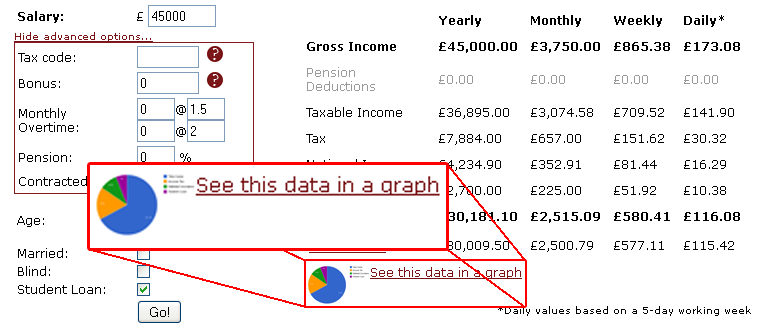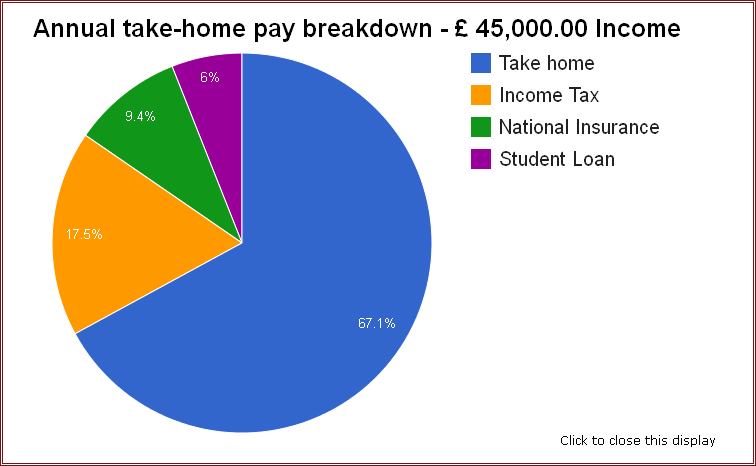personal allowance
New – choose your tax year!
The Salary Calculator has (finally!) been updated so that you can choose to view calculations for different tax years. You will see that there is now a drop-down box in which you can choose the tax year that should be applied. By default, the current 2012/13 tax year will be selected so if you just want to see current values you do not need to do anything.
Details for previous tax years going back as far as the 2005/6 tax years have been made available, so you can see how your take-home pay has changed over the years. You may have forgotten how the personal tax-free allowance has increased over the past few years, which gives you more to take home – or perhaps you’d just like to see how far your salary would have gone a few years ago.
I do plan to add more past years (i.e. before the 2005/6 tax year) to The Salary Calculator, and of course, when the details of 2013/14 and further forward become available, they will be added to the site. Head over to The Salary Calculator to try it out. Please let me know in the comments below if you find this option useful or not!
None of the content on this website, including blog posts, comments, or responses to user comments, is offered as financial advice. Figures used are for illustrative purposes only.
What would a 30% flat tax be like?
Earlier this month, the 2020 Tax Commission published a report promoting replacement of our current income tax system, which has varying rates of tax (from 20% to 50%) and National Insurance (typically 12% and 2%), with a simpler system which has a single flat tax at a rate of 30%. They also recommended raising the personal allowance (the amount you can earn tax-free) to £10,000 per year, from its current £8,105.
I thought it would be interesting to see how this plan, if implemented, would affect us when we get paid each month. The following chart compares the April 2012 tax rates in blue with the simplified version in red:
As you can see, under this proposal everyone who currently pays tax on employment would take home more money each month, as the total amount due would be less. The 2020 Tax Commission say that as part of this plan, schemes that currently allow people to take income through a business, avoiding National Insurance, would be removed. This might mean that people who are using such schemes to avoid tax at the moment would pay more under the proposal.
But, as you’ve probably realised, if (almost) everyone is paying less tax, that means the Government will get less money. This is indeed true – the gap between the two lines on the chart represents how much less the Government would get each year – and the commission also recommend abolishing inheritance tax and similar taxes, which would further reduce Government income. This would mean further cuts in public spending – which would be difficult to swallow at the moment. More reaction on the report is in this useful BBC article.
Free Android app for The Salary Calculator
A brand new app has just been launched on the Android Marketplace which allows you to use The Salary Calculator without being online. The Salary Calculator app allows you to perform salary calculations as you would on the website, but installed on your Android smartphone.
The app supports both annual salary and hourly wage calculations, including income tax, National Insurance and student loan repayments. You can also include overtime, pension contributions and tax codes, and view the results annually, monthly or weekly. It’s up to date with April 2012 data but you can choose previous tax years if you want to compare older rates. What’s more, the app is completely free to use!
Budget 2012 update
Today, the Chancellor gave his annual budget speech in the House of Commons, outlining government spending plans for the next couple of years. The details of income tax and National Insurance from 6th April 2012 had already been provided, so as I have explained in a previous post, The Salary Calculator is up to date with the latest tax information.
However, the Chancellor took the opportunity to outline plans for income tax from April 2013, and there will be a few changes. Firstly, the under-65 tax free allowance will be increased from April 2013 to £9,205, in line with the coalition pledge to increase the tax-free personal allowance to £10,000 before the next election. This is an increase of £1,100 on the April 2012 value, saving those on low and middle incomes up to £220 per year. However, the increased personal allowances currently available to those over 65 will be frozen and, for those not yet receiving the increased allowances, replaced by a single allowance for all ages (although this change will not take immediate effect).
Another change in 2013 will be to reduce the top rate of income tax, paid by those earning over £150,000 per year, from 50% to 45%. The 50% rate was introduced by the Labour government, where previously such income would have been taxed at 40%. This will be popular with traditional Tory voters but Labour are complaining that the richest are getting tax cuts in this time of austerity.
The Salary Calculator will be updated with the April 2013 values nearer the time – in the meantime, you can see what the April 2012 changes will make to your pocket each month by checking The Salary Calculator 2012. There is also a comparison utility so you can easily see the difference between 2011 and 2012.
New – graphical representation of salary deductions
To help you to visualise where your income deductions are going, and how much of your money you get to keep (take-home pay), I thought I would add some pie charts to The Salary Calculator. Now, when you have entered your details and are viewing the table of results, there is an option to see a graphical representation of that information:
Click on this link, and an overlay will pop up, to show you an interactive pie chart that clearly explains where your money goes each year:
Of course, it will also show pension and student loan deductions if those apply to your calculations. To get started, head over to The Salary Calculator and enter your details. I hope you find this new tool useful – please use the comments section below to leave any feedback or suggestions for improvements.
Categories
Tags
-
50% tax
2022
April 2010
April 2011
April 2012
budget
coronavirus
cost of living crisis
covid-19
debt
dollar
economics
Economy
election
Employed and Self Employed
Foreign Currency
foreign exchange rates
HMRC
holiday
holiday money
house prices
houses
income tax
interest rates
Jobs
Loans
Mortgages
national insurance
Pay As You Earn
pension
Pensions
personal allowance
pound
recession
recovery
savings
Self Assessment
self employed
self employment
student loans
tax rates
The Salary Calculator
unemployment
us
VAT
Sponsored Links
Archive
- May 2025
- April 2025
- March 2025
- November 2023
- September 2023
- August 2023
- July 2023
- June 2023
- May 2023
- April 2023
- March 2023
- February 2023
- January 2023
- December 2022
- November 2022
- October 2022
- September 2022
- August 2022
- July 2022
- June 2022
- May 2022
- April 2022
- March 2022
- February 2022
- January 2022
- December 2021
- November 2021
- October 2021
- September 2021
- August 2021
- July 2021
- June 2021
- May 2021
- April 2021
- February 2021
- January 2021
- December 2020
- November 2020
- October 2020
- September 2020
- August 2020
- July 2020
- June 2020
- May 2020
- April 2020
- March 2020
- February 2020
- November 2019
- September 2019
- April 2019
- March 2019
- December 2018
- April 2018
- March 2018
- January 2018
- May 2017
- March 2017
- February 2017
- September 2016
- June 2016
- March 2016
- February 2016
- January 2016
- June 2015
- April 2015
- March 2015
- February 2015
- January 2015
- November 2014
- October 2014
- July 2014
- June 2014
- May 2014
- March 2014
- February 2014
- January 2014
- November 2013
- October 2013
- August 2013
- July 2013
- June 2013
- May 2013
- April 2013
- March 2013
- February 2013
- January 2013
- December 2012
- November 2012
- October 2012
- September 2012
- August 2012
- July 2012
- June 2012
- May 2012
- April 2012
- March 2012
- February 2012
- January 2012
- December 2011
- October 2011
- May 2011
- April 2011
- March 2011
- January 2011
- December 2010
- August 2010
- July 2010
- June 2010
- May 2010
- April 2010
- March 2010
- February 2010
- January 2010
- December 2009
- November 2009
- October 2009
- September 2009
- August 2009
- July 2009
- June 2009


